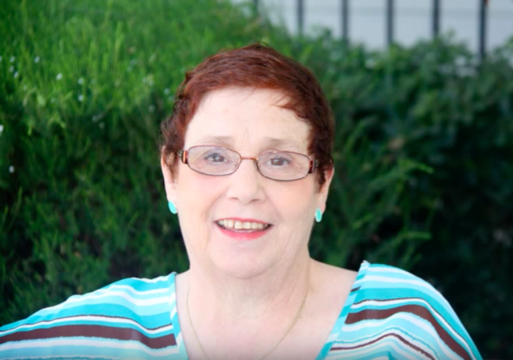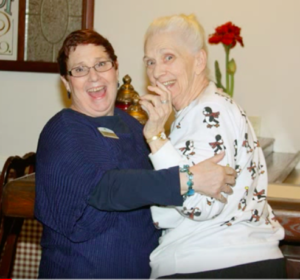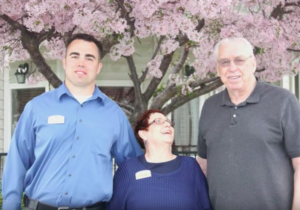In this second part of a two part interview, I continue my conversation with Stephanie Howard, Residence Service Director of Regency of Evergreen Valley in San Jose. We left off talking about how person-centered care adds quality to the uniquely “small world” inhabited by a person with dementia.
Editors’ Note: This interview has been edited for length and readability.

Credit: California Assisted Living Association/youtube
Laura Hayden: Last week you emphasized how important eye-to-eye contact is when communicating with a person struggling with dementia. How else can we connect with them more effectively?
Stephanie Howard: First of all, the more you know about the person the better. Here at Regency we create a document we call the life journey to help us get to know our residents in memory care. It’s a six-page history of just that — their memories — including personal interests and hobbies. I actually started using it with my assisted living residents too because many of them have a touch of MCI (mild cognitive impairment).
Laura: Six pages must cover a lot of their past. Once you’ve gathered this information, how do you use it?
Stephanie: Take my Helen for instance. Six months ago, based on the information collected in her life journey, we put a picture in front of her and within 3 minutes she drew that picture to a T. Right now we are featuring a show of her work in the library.
Laura: That’s a remarkable story. How did her family react to this talent you uncovered in her life journey?
Stephanie: They cried tears of joy for two days! They didn’t even realize she could still draw. They thought that was gone by this point in her disease. Yet, just by putting something in front of her, based on what we knew about her past, we got results.
Laura: So revisiting the past and pastimes can have positive effects?
Stephanie: By all means. You don’t want to start a visit with, ”Hi Mom, How are you today? Did you eat your breakfast? Let’s comb your hair.” Mom may be sitting there trying to remember just who is in front of her. Bring something with you – a photograph, some music. They all remember the words to songs they grew up and grew older with. Bring something they understand. That’ll convey the message that you want them to feel comfortable.

Stephanie is a favorite among the residents
at Regency Evergreen
Credit: CALA/youtube
Laura: Is it always a good idea to bring up the past?
Stephanie: It depends on the level of illness — on where they are at with that memory. You don’t want to bring up something that they are going to keep on forgetting. Don’t set them up for failure by putting them in the right church but the wrong pew. It’ll only upset them to dwell on what they can’t remember or maybe don’t even know. Not everybody plays cards.
Laura: And what if they do get upset?
Stephanie: When our memory care residents are having a really bad day, we find something in their life journey that will redirect the conversation to something they do remember. They love that. Recently, for one resident, it was rollerskating. People don’t even use the word rollerskating anymore but she understood rollerskating.
Laura: You’ve given us good advice on what we should do — like using the 12-inch window when speaking and sharing past experiences.What should we avoid doing?
Stephanie: Four years ago I became quite frustrated with my assisted living residents with MCI. All of a sudden we weren’t seeing much of them. They were in their apartments watching the stupid boob tube. Television is not the right activity — it overstimulates. First Harry’s kissing Sally…then there’s a car going off the bridge…and next a Twinkies commercial comes on. The MCIs and memory care patients are still back at Harry kissing Sally trying to make sense of what’s going on.
Laura: That advice would definitely add quality to all our lives — all screens included. Are there other pitfalls we should be aware of?
Stephanie: It’s important, especially if the person is high functioning, not to treat them like children. And when appropriate, let them make their own decisions. Recently one of my residents got married. People said, “They can’t do that.” Well, yes they can! They still have their rights. And they loved each other. It was a beautiful wedding — a fake wedding — but to them, they met their needs for themselves. They cuddle each other every night and love each other very much.

Stephanie flanked by a resident on her right and
his son, who works with her.
Credit: CALA/youtube
Laura: Is there something you’d like to add that I may not have asked you?
Stephanie: When I talk to the families of my residents and family caregivers I always ask them, “Are we going to talk about how the disease is affecting you or how it’s affecting your loved one?” These are two totally separate issues. The decisions they make are going to affect their loved ones more than anything else they’ve ever done in their lives, because this is the end of their lives. It’s their loved one’s journey – not theirs..
Like I said earlier, all elderly suffering with dementia want is love, respect, dignity and choice. Yes, dementia is a terrible thing, but so is cancer, COPD, diabetes, and other maladies. We can’t get out of this place without having something. But you can make dementia less stressful for your loved one by understanding the small world the patient operates in from one day or one hour or one moment to the next, and adjusting your interaction with them accordingly.
Laura: Thanks so much for speaking with us Stephanie.You’ve given me an insightful view of how to better connect with people struggling with dementia.
If you missed Part One of our interview with Stephanie Howard, catch up here.

 How Can We Better Reach People Who Struggle With Dementia?
How Can We Better Reach People Who Struggle With Dementia?


 Funeral Home Owner Chris Johnson Spending Halloween in Jail
Funeral Home Owner Chris Johnson Spending Halloween in Jail
 Our Monthly Tip: Toast a Loved One with a Personalized Glass
Our Monthly Tip: Toast a Loved One with a Personalized Glass
 My Cousin’s Death Taught Me the Meaning of Life
My Cousin’s Death Taught Me the Meaning of Life














